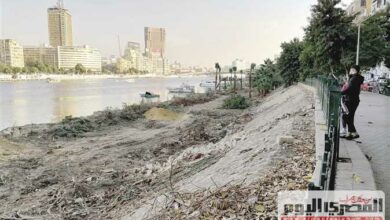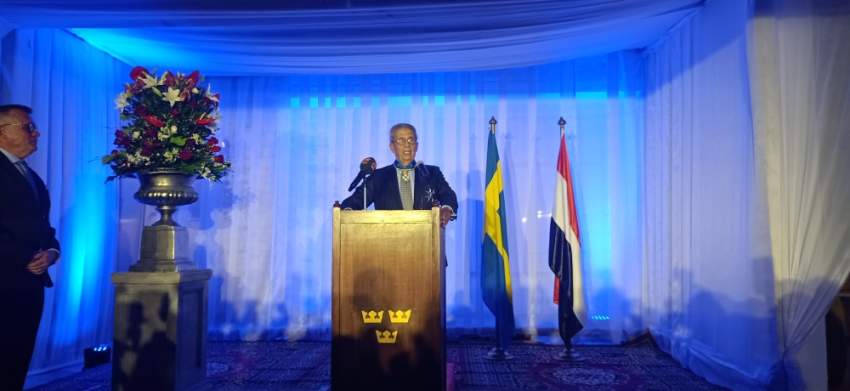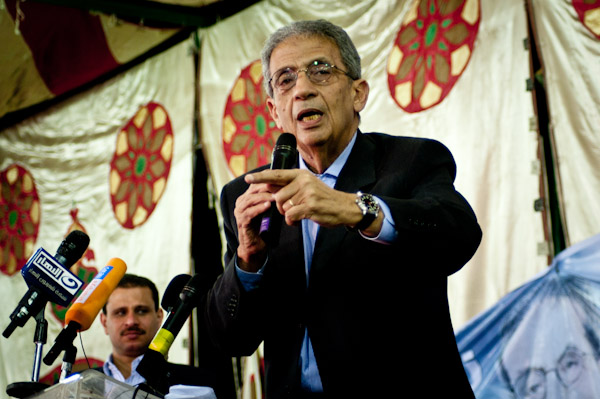With the Muslim Brotherhood fielding candidates and the surprise candidacy of former spy chief Omar Suleiman — perceived to be backed by the military — front-runner Amr Moussa may emerge as the “civil” candidate with enough popularity to hold back both the Islamists and the military.
While Suleiman and the Muslim Brotherhood’s primary candidate, Khairat al-Shater, represent new competition to Moussa, they have at the same time created a new scale by which candidates are judged, putting him in a more positive light and making him, in comparison, acceptable for some pro-revolution voters who initially rejected his candidacy.
On one hand, the new contenders, well-established politicians with similar promises of stability, are strong opponents for Moussa, who has so far maintained the lead in the presidential race, seemingly without too much difficulty, according to the scant polling data available. On the other, they represent examples of a much tighter connection with Mubarak’s regime and threats to the civility of the state that overshadows criticism of Moussa's service under the regime.
Competing with Suleiman
One of Moussa’s selling points with the electorate is his experience as a politician and his potential ability to bring security and stability, which his campaign has made a central part of his platform. But Suleiman also has a long career in government and experience keeping Egypt “stable.”
According to political scientist Samer Soliman the differences between Moussa’s civilian background in the well-respected Foreign Ministry and Suleiman’s military background in the notorious General Intelligence Services mean that the two candidates are only competing over a small sector of voters.
Soliman divides Moussa’s constituency into three: Those basing their vote on name recognition, those avoiding Islamist candidates, and those who want an experienced political leader. It is only within the last constituency that Moussa will lose voters to Suleiman, specifically those who believe Egypt needs an iron fist.
“For them, if Moussa was seen as a tough man that can do that, Suleiman is even tougher,” he says, referring to the former intelligence chief nicknamed the “minister of torture.”
Feloul is relative
Early in the race, despite his wide popular appeal, Moussa was rejected by revolutionary forces who considered him the candidate representing the resurrection of the old regime, a remnant, or "feloul." Many of Moussa’s rallies in the early months of his campaign were attacked and vandalized.
Now that Suleiman and Ahmed Shafiq, the last prime minister under Mubarak, are in the race, it is easier to downplay Moussa's connections because he was out of the cabinet for the last 10 years of his career, serving as secretary general of the Arab League.
On Sunday, Wasat Party MP Essam Sultan, prompted by Suleiman’s candidacy announcement, proposed a bill banning those who served under Mubarak in the past five years from running for office or receiving a cabinet post in the 10 years following his resignation. The bill was passed in the Proposals and Complaints Committee, and will then go to the Constitutional and Legislative Affairs Committee before heading to the floor of the People’s Assembly for a vote.
But even the Wasat Party does not consider Moussa to be feloul. He has been invited to Wasat Party conferences as a “national candidate,” including an event to discuss reactions to Suleiman’s candidacy.
“We can’t isolate anyone who has a relation to Mubarak in the last 30 years because, unfortunately, we were living in an atmosphere of political drought where only one body was allowed to practice politics. These are the people who have knowledge of the workings of the political process,” said Tarek al-Malt, Wasat Party spokesperson.
Malt says that politicians who tolerated Mubarak’s plan to groom his son Gamal as a successor in the last five years are considered to have sold the country out.
“But Mr. Amr Moussa attends all our events in this sensitive stage where we feel the revolution is in danger. All the national powers have to unite against the candidate backed by the military council,” says Malt, reflecting a fear of Suleiman’s candidacy that is causing many to be more forgiving regarding Moussa’s past.
There is widespread speculation that Mubarak deliberately excluded Moussa from his inner circle and national politics in fear of his growing popularity, sending him to the more symbolic but less involved position at the Arab League.
Moussa stayed on the sidelines throughout the 18 days that preceded Mubarak’s resignation and contributed to mediation efforts between revolutionaries and the regime. Since then, he has used his reputation for disagreeing with the former president to portray himself as an inside reformer and to distance himself from Mubarak's administration.
In a recent television appearance shortly before Suleiman announced his candidacy, Moussa dismissed the possibility as unlikely, saying that “Omar Suleiman is smarter than to think that the last vice president in the old order can be the first president in the new order.”
However, not everyone is willing to forget Moussa’s connections to the old regime with the emergence of more feared options.
A campaign titled “They won’t rule” has been working to raise awareness among people about Shafiq, Suleiman and Moussa.
“Anyone who belonged to the old regime will not side with the revolution and the revolutionaries, and it doesn’t matter whether they stayed 10, 20 or 30 years — they still stayed in a corrupt regime for the sake of personal glory and financial benefits,” says Islam Molda, the movement’s spokesperson.
Bulwark against Islamists
The Muslim Brotherhood’s surprise decision last week to run Shater for president and Mohamed Morsy, the president of its Freedom and Justice Party, as a backup candidate has increased fear within the sector of society that rejects Islamist rule. The Brotherhood already holds the highest percentage of seats among political parties in both houses of Parliament.
A recent poll conducted by the Egyptian Union for Human Rights Organizations said that 78 percent of Egypt’s Copts plan to vote for Moussa, while 22 percent will vote for Muslim Brotherhood defector Abdel Moneim Abouel Fotouh.
“Those who don’t want Islamists and don’t want Hosni Mubarak’s regime in its old form to return will choose Moussa,” says Soliman. “He is not a revolutionary; however, he has an amount of intelligence, flexibility and popularity that makes him seem independent, but the other two — they will try their hardest to retain the old regime.”
Soliman says the voters seeking a civil state are leaning toward Abouel Fotouh, seen as a moderate figure despite his affiliation with the Muslim Brotherhood, and Moussa. He adds that this group could be swayed in Moussa’s favor if Abouel Fotouh decides to appeal to the large voting mass of Islamist supporters.
Perhaps his strongest competitive edge, an Al-Ahram poll conducted in the first week of April and placing Moussa at the head of the pack showed that while most candidates have a stronghold in certain sectors, Moussa’s supporters are a cross section of society.
Explaining his lagging behind Moussa despite similarly offering alternatives to the Islamic state, the poll shows that Abouel Fotouh’s supporters, on the other hand, belong mostly to the educated classes, while Suleiman’s belong to less-educated voters.
Betting on the street
While the Islamic and military candidates get their electoral weight from the backing of strong institutions, Moussa’s ability to compete with them comes from his broad popular appeal. A mix of a history filled with public-pleasing stances — especially regarding Israel — a charisma and a smart campaign have all contributed to this.
Hany Galal, a former army officer who leads Moussa’s campaign in Giza, attributes his popularity to his image as “the feared and loved.”
Galal says that the campaign has relied since its first day on communication with the public and showing its interest in the problems that matter the most to people. While most candidates’ posters hold a poetic slogan about dignity, revolution or righteousness, Moussa’s posters display pragmatic statements addressing the problems that are most pressing to the Egyptian people.
The posters feature a picture of a smiling Moussa with a promise such as “creating job opportunities” or “returning safety and stability.”
On the door of Moussa’s campaign office in Giza is a banner reading “World leaders trust Amr Moussa and treat him respectfully.”
Hossam al-Khouly, assistant secretary general of the Wafd Party, says that between the Muslim Brotherhood and the candidates that are “completely tied” to the former regime, Moussa was the party’s choice.
“We are not saying that those running are the best people in the country, but we have to choose from those available,” says Khouly.




